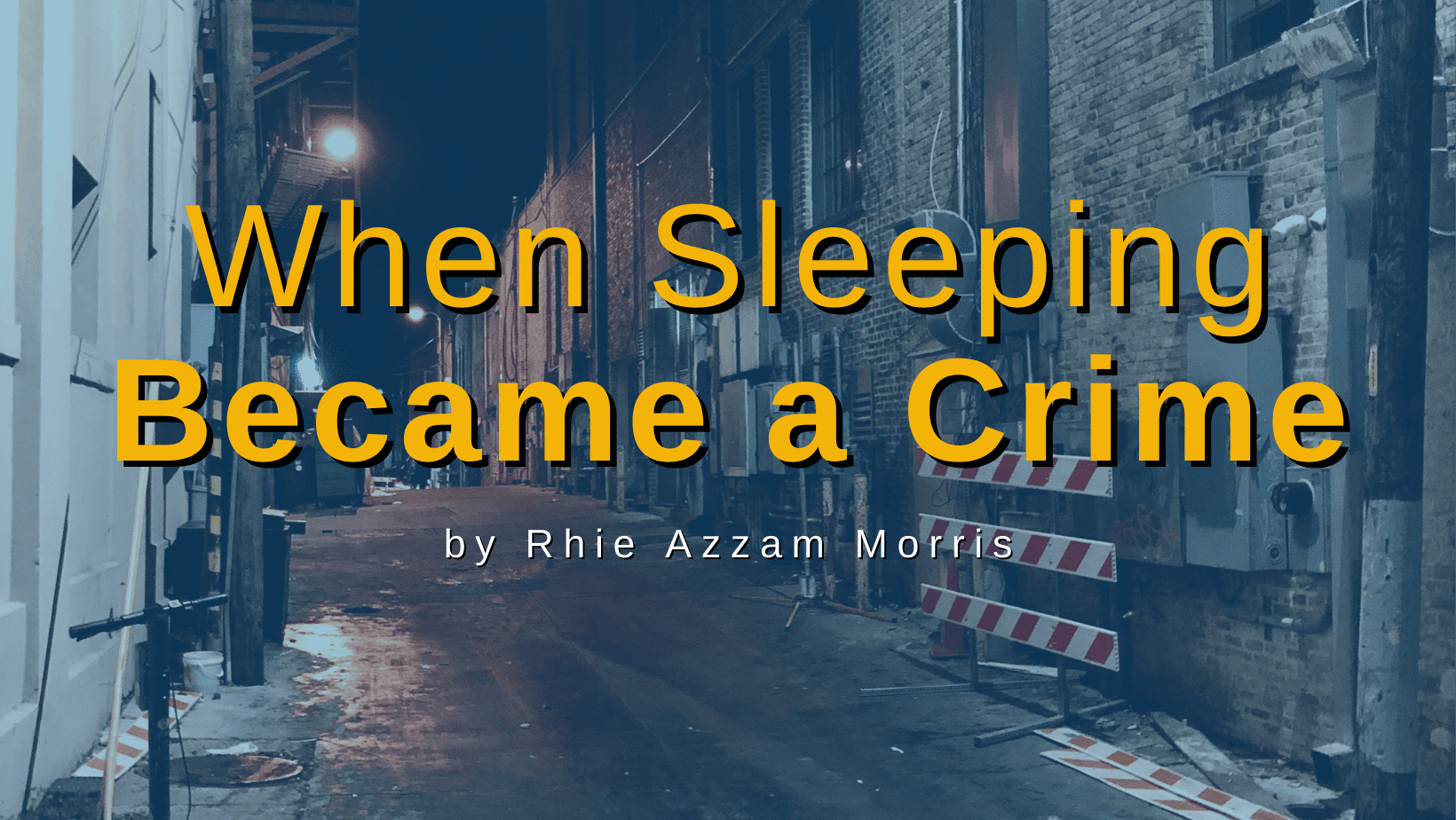When Sleeping Became a Crime
by Rhie Azzam Morris
I was 23 years old the first time I experienced sleeping as a crime in Austin. I was six years into my on-again/off-again relationship with homelessness, having hitchhiked across the country and calling Austin my home-base since the age of 20.
I had been living on the Drag, a “Drag Rat” if you will, and many did. The dehumanization started long before the policies did. Fifteen years ago, West Campus hadn’t fully developed out and so there existed parking lots and alleyways and quiet corners where I could disappear for the night. Where I might be safe for a few hours, where someone might not stumble upon me sleeping and rob me, rape me, or beat me. But I always knew the possibilities. And I often saw the outcomes in the mornings.
I nightly slept with a blunt object (whatever I could find, a broken 2×4, a branch, some busted concrete). And a couple of times, I had to use it.
A lot of people can’t understand the cycles of homelessness, particularly in a time when the topic has become so politically charged in our community that we often allow ourselves to erase the humanity that exists at its core. We aren’t capable of seeing the stories behind the people when we refuse to see their humanity.
Maybe you were like me, a young woman living in the depths of untreated mental illness, alone, without a crew or protection. You wanted to get a job, but you had no address. You had years of experience waiting tables, tending bar, but where would they send your check? You were robbed one day walking down the road and thus, you had no state ID. So you were just trying to survive. Doing the best you could. Young women on the street face a unique situation. If you aren’t actively escaping domestic violence and if you don’t have a child, there are almost no shelter beds available to you in this city. You might try to get in the pool for the Salvation Army, but they fill up quickly.
Some folks don’t understand that no one “chooses” to be homeless.
It’s a false choice unless one believes that “homelessness or death” is a choice.
I believed for many years that I was “choosing” to be homeless, a belief I needed in order to feel a modicum of control in a life where I had none. With no access to needed services and barriers to every next step, I had to believe it was my choice. But there was never a choice.
We have nowhere to go. We deserve safety and care and all the things that come with our humanity.
You who would criminalize us have forgotten our humanity.
The politics surrounding Proposition B have once again made pawns of human beings, and some in this city have chosen to participate in our dehumanization under the guise of “what’s best for us.” What’s “best” for us is the ability to sleep at night unmolested. If we as a city don’t create access to beds, then the base thing to do to honor someone’s dignity is to not throw us in jails. Did you know that when you move for criminalization, you are adding to a cycle your tax dollars pay more to perpetuate? Did you know it actually costs less to house folks than it does to arrest and jail them?
When I was 23, I was homeless in Austin. I found safety in parking lots, alleyways, doorways. I watched people I love be turned away from shelters and die in the night. I starved. I was scared. But I didn’t go to jail. I lived here in a time when awful things could happen to you when unsheltered, but getting a police-issue boot to the head was not one of them.
The first time we experienced the enforcement of these ordinances happened on December 26, 2006.
At midnight.
For those of us living on the Drag, sleeping became a crime on the midnight of Christmas Day. On a day when most are warm at home with their families and many folks on the streets are trying to find moments of peace and ways to celebrate with each other, we went to sleep in the cold, on top of cardboard to preserve our body heat, wrapped in sleeping bags. This became the police’s excuse for kicking us in the head: “We couldn’t tell which was your head or feet, oops!”
The next morning, we woke to discover folks missing, our crew, our friends, people we loved. We couldn’t find them. We didn’t know where they were. They were in jail. I lived through the reality of sleeping becoming a criminal offense. We all did.
It is unconscionable that this “Keep Austin Weird” community would move to criminalize human beings for sleeping. It is uncomfortable for many to “have to” see it now. I get that, but it’s important to note that Proposition B isn’t about protecting our neighbors – the real-life breathing humans who are someone’s children, parents, aunts, uncles, friends – but instead is creating further barriers to safety, security, and dignity. If you want to vote for humanity, you have to vote against Prop B. If you believe that humans deserve dignity, May 1st is when you have a chance to use the power of your voice and your vote. This is where you take the stand.
When Save Austin Now says they aren’t against homeless folks, they’re against camping, they’re saying they want to see the heightened visibility of human suffering swept back under the rug. We have an opportunity to build an actual end to homelessness in this community. Not to force people back into the shadows, but to ensure that homelessness is “rare, brief, and non-recurring.”
This is work we have to do together.
And when you drive past your kin on the side of the road and think to yourself that you want to help and don’t know how? You have an astounding opportunity RIGHT NOW to use the power of your voice to make a difference. Vote No on Prop B: It’s a vote for a thriving community. It’s a vote for dignity. It’s a vote for humanity.
Rhie Azzam Morris has worked in Austin’s homeless response system for more than three years and is now a consultant using her lived expertise of homelessness to help other communities across the country develop equitable housing and response systems. Learn more at rhieinnon.com.

